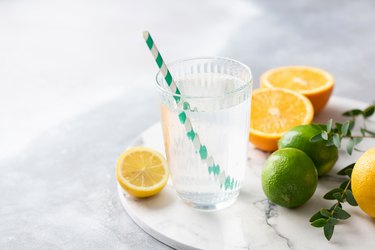
Quinine is a prescription drug most commonly used to treat malaria, according to the Mayo Clinic. Recently, though, you may have heard about it in connection to COVID-19, the disease caused by the novel coronavirus.
That's because doctors have been testing chloroquine, a synthetic version of quinine, as a possible treatment for COVID-19, according to respected news sources such as The New York Times. Note that chloroquine is not being tested as a vaccine, and the verdict is still out on whether it is effective as a treatment.
Video of the Day
Video of the Day
Quinine or any synthetic derivatives should only be used according to a doctor's recommendations. If misused, quinine can have serious side effects.
However, quinine is used in small amounts to flavor certain beverages. But ingesting quinine in foods and drinks does not prevent malaria or any other kind of infection, according to Harvard Health Publishing.
Get tips on how to stay healthy, safe and sane during the novel coronavirus pandemic.
Here's what you need to know about quinine in food.
What Is Quinine?
Quinine is made from the bark of the cinchona tree and has been used to treat malaria — a disease caused by parasites that infect the red blood cells — for almost 400 years, according to a paper published May 2011 in Malaria Journal. However, quinine can have serious side effects.
Potential Side Effects of Quinine
- Blurred vision
- Change in vision color
- Confusion
- Diarrhea
- Hearing loss
- Nausea
- Vomiting
Note that quinine should never be taken to prevent malaria, according to the U.S. National Library of Medicine.
If you're taking quinine, it's crucial that you closely follow your doctor's instructions. Make sure you're taking the exact recommended dosage for the amount of time your physician advises.
Warning
Do not take quinine without a prescription from a doctor. If you have been prescribed quinine, only take the drug according to your doctor's recommendations. If you experience symptoms like blindness, blurred vision, chest pain or lightheadedness, seek medical care immediately.
Drinks and Foods That Contain Quinine
You may have seen quinine on the ingredient list of some foods or carbonated beverages like tonic water. Quinine is what gives tonic water its bitter taste.
Tonic water or any other quinine-containing food or drink doesn't have nearly enough quinine to treat malaria. The amount of quinine in any food is strictly regulated by the Food & Drug Administration. Any food containing the ingredient can have no more than 83 parts per million of quinine, which is considered generally safe for consumption.
To put this into perspective: A 1-liter bottle of tonic water (about 34 ounces) has 83 milligrams of quinine. An antimalarial quinine tablet has 500 to 1,000 milligrams, per Harvard Health Publishing.
Warning
The amount of quinine in beverages like tonic water is minuscule, but drinking large amounts could lead to dangerous side effects, according to Harvard Health Publishing. Do not drink beverages with quinine for medicinal purposes.
The Bottom Line on Quinine
The amount of quinine found in tonic water or other sodas is generally safe for consumption. Drinking tonic water in moderation will not cause any quinine-related symptoms. However, quinine for medicinal purposes should only be used according to your doctor's orders.
If you are prescribed quinine, be sure to tell your doctor if you have any other medical conditions. In particular, quinine can cause low blood sugar, which is a serious concern for people with diabetes, according to the Cleveland Clinic.
Additionally, quinine can interact with other medications. The Cleveland Clinic advises avoiding antacids containing aluminum or magnesium for two hours after taking quinine.
Be sure to discuss all your medications with you doctor. Don't use quinine to treat any condition without first speaking with a physician.
If you are taking prescription quinine and experience any adverse side effects, consult your health care professional as soon as possible. Or, if you have any life-threatening symptoms, seek emergency care immediately.
Concerned About COVID-19?
Read more stories to help you navigate the novel coronavirus pandemic:
- Mayo Clinic: "Quinine (Oral Route)"
- Harvard Medical School: "Will Tonic Water Prevent Nighttime Leg Cramps?"
- Food & Drug Administration: "CFR - Code of Federal Regulations Title 21"
- U.S. National Library of Medicine: "Quinine"
- Malaria Journal: "Quinine, An Old Anti-Malarial Drug In A Modern World"
- Cleveland Clinic: "Quinine Tablets or Capsules"
- The New York Times: "Explainer: Why Are Malaria Pills Being Used Against Coronavirus?"
Is this an emergency? If you are experiencing serious medical symptoms, please see the National Library of Medicine’s list of signs you need emergency medical attention or call 911.